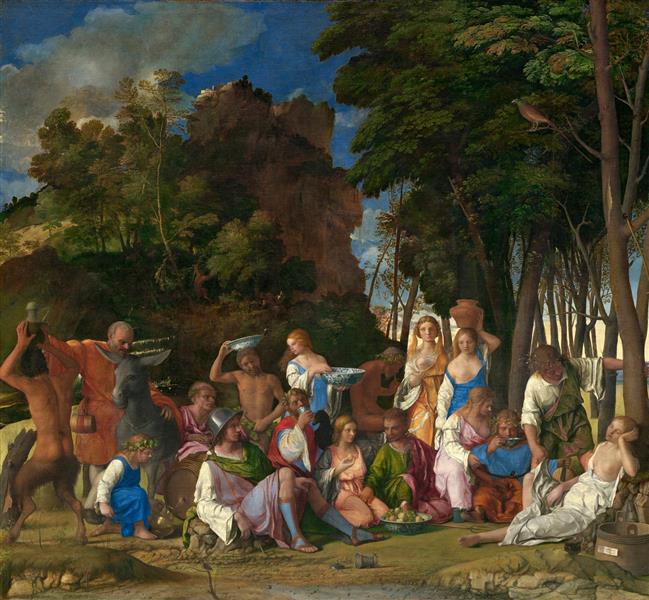Opis
Titian's painting "The Feast of the Gods," executed in 1529, is a fascinating testament to the intersection between the Venetian Renaissance and mythological traditions that endure in Western art history. Originally conceived by Giovanni Bellini, Titian took on the task of completing the work, injecting it with his charismatic color palette and a dynamic style that emphasizes human interaction and the sensuality of nature.
From the first glance, the work invites the viewer to a visual feast, where the gods of classical mythology meet in an exuberant and festive environment. The scene takes place in a richly banal landscape, where a meandering river and abundant vegetation give the impression of being an ideal place for the revelation of the divine in the everyday. The composition is masterful, with a subtle balance between the figures and the environment. The figures, organized in a semicircular edge, direct the gaze towards the center, where the vital action of the scene is concentrated.
The characters that populate the painting evoke a vibrant mythical universe. Deities such as Dionysus, the god of wine, are depicted with elements associated with celebration, such as grapes and drink, symbolizing abundance and pleasure. The state of the relationship between the characters, expressed through body language and the arrangement of their bodies, reveals a meticulous attention to the subtleties of human desire and social interaction. Titian, in this context, presents a vision not only of divinity, but also of human nature, thus delivering a work that transcends the mystical.
The use of colour is particularly prominent in this painting. Titian's palette shines in the variety of hues that bring life and energy to each figure. Warm tones predominate, from the golds of the clothing to the blues and greens that evoke the freshness of the natural environment. Light, moreover, acts as a protagonist, modelling volumes and accentuating the realism of the figures. The sfumato technique, found in Titian's work, softens the contours and allows the colours to flow into each other, creating an enveloping atmosphere that draws the viewer into the heart of the feast.
Interestingly, The Feast of the Gods is not only a work that reflects Greco-Roman mythology, but it also fits into a broader context within Renaissance art, where nature and humanity were explored. The dialogue between the divine and the human becomes a recurring theme, present in contemporary works by other great masters such as Raphael and Michelangelo, who also explored themes from classical mythology but with a different approach.
It is pertinent to mention that this work was commissioned to Titian by the Duke of Ferrara, Alfonso I d'Este, who was seeking a visual narrative that would symbolize opulence and pleasure through the divine. The culmination of this work represents Titian's skill in handling not only the commission, but also his ability to enrich an already established concept with his own poetic and sensorial vision. Thus, "The Feast of the Gods" stands not only as a feast for the eyes, but as a reflection on the nature of pleasure, abundance, and human relationships in the context of divinity.
As a whole, The Feast of the Gods is one of Titian's most iconic works that encapsulates the essence of the Venetian Renaissance. Through its mastery of composition, vibrancy of color, and depth of subject matter, this painting not only celebrates a meeting of gods and mortals, but invites a meditation on the joy of living in these earthly and heavenly interactions.
KUADROS ©, a famous painting on your wall.
Hand-made oil painting reproductions, with the quality of professional artists and the distinctive seal of KUADROS ©.
Painting reproduction service with satisfaction guarantee. If you are not completely satisfied with the replica of your painting, we will refund 100% of your money.

